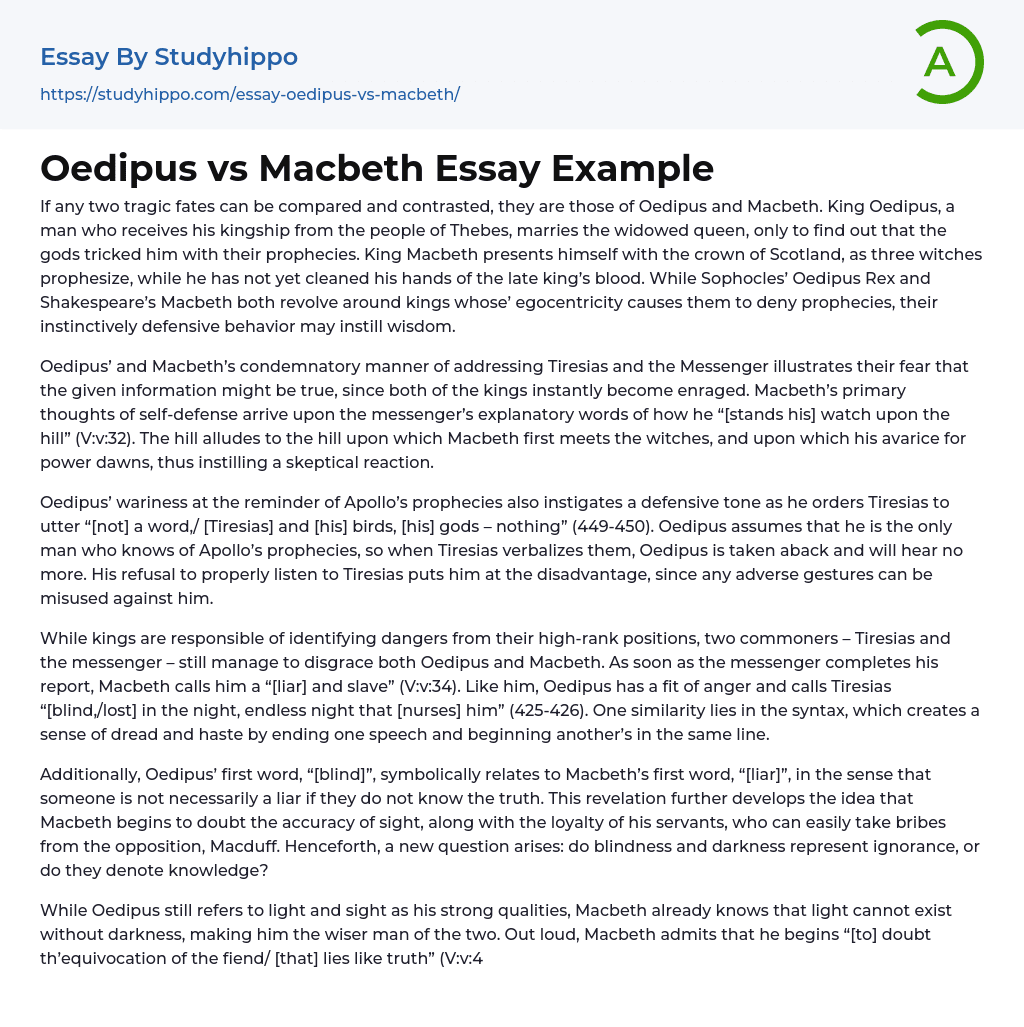If any two tragic fates can be compared and contrasted, they are those of Oedipus and Macbeth. King Oedipus, a man who receives his kingship from the people of Thebes, marries the widowed queen, only to find out that the gods tricked him with their prophecies. King Macbeth presents himself with the crown of Scotland, as three witches prophesize, while he has not yet cleaned his hands of the late king’s blood. While Sophocles’ Oedipus Rex and Shakespeare’s Macbeth both revolve around kings whose’ egocentricity causes them to deny prophecies, their instinctively defensive behavior may instill wisdom.
Oedipus’ and Macbeth’s condemnatory manner of addressing Tiresias and the Messenger illustrates their fear that the given information might be true, since both of the kings instantly become enraged. Macbeth’s primary thoughts of self-defense arrive upon
...the messenger’s explanatory words of how he “[stands his] watch upon the hill” (V:v:32). The hill alludes to the hill upon which Macbeth first meets the witches, and upon which his avarice for power dawns, thus instilling a skeptical reaction.
Oedipus’ wariness at the reminder of Apollo’s prophecies also instigates a defensive tone as he orders Tiresias to utter “[not] a word,/ [Tiresias] and [his] birds, [his] gods – nothing” (449-450). Oedipus assumes that he is the only man who knows of Apollo’s prophecies, so when Tiresias verbalizes them, Oedipus is taken aback and will hear no more. His refusal to properly listen to Tiresias puts him at the disadvantage, since any adverse gestures can be misused against him.
While kings are responsible of identifying dangers from their high-rank positions, two commoners – Tiresias and the messenger
– still manage to disgrace both Oedipus and Macbeth. As soon as the messenger completes his report, Macbeth calls him a “[liar] and slave” (V:v:34). Like him, Oedipus has a fit of anger and calls Tiresias “[blind,/lost] in the night, endless night that [nurses] him” (425-426). One similarity lies in the syntax, which creates a sense of dread and haste by ending one speech and beginning another’s in the same line.
Additionally, Oedipus’ first word, “[blind]”, symbolically relates to Macbeth’s first word, “[liar]”, in the sense that someone is not necessarily a liar if they do not know the truth. This revelation further develops the idea that Macbeth begins to doubt the accuracy of sight, along with the loyalty of his servants, who can easily take bribes from the opposition, Macduff. Henceforth, a new question arises: do blindness and darkness represent ignorance, or do they denote knowledge?
While Oedipus still refers to light and sight as his strong qualities, Macbeth already knows that light cannot exist without darkness, making him the wiser man of the two. Out loud, Macbeth admits that he begins “[to] doubt th’equivocation of the fiend/ [that] lies like truth” (V:v:42-43). By applying a simile, paradox, and allusion, in his statement that “lies [are] like truth”, he conveys his bitterness towards the figurative and literal darkness in which the witches predict his future.
While the witches’ first prophecies sound great to a man who desires power, their latest prediction of his downfall make Macbeth feel betrayed, in the sense that he trusted them. In the other play, Oedipus prolongs his blind rage, stating that Tiresias lives [seer] blind in
his craft” (442). The irony of his exclamation has a double meaning. On one hand, a blind seer is a complete onomatopoeia; while on the other hand, Oedipus does not realize that he may just as well be describing himself.
In contrast to this wild outburst, Macbeth is uncharacteristically calm. In order to further develop his new idea about light, Macbeth “[‘gins] to be aweary of the sun/ [and wishes] th’estate o’th’world were now undone” (V:v:48-49). Basically, the sun’s allusion to light and truth portrays Macbeth as a man who admits that he no longer wants to live in the “world” guilt which he created himself. On the contrary, Oedipus blindly claims that he, “or anyone else who sees the light” (427), cannot be hurt, figuratively speaking, by Tiresias.
If Oedipus keeps up his selfishness, he may end up harming himself rather than anyone else would. What Oedipus does not understand, is that he is subconsciously aware of Macbeth’s idea that light can be deceptive as well as enlightening. In conclusion, Macbeth and Oedipus are both as self-centered as the other, but Macbeth is the wiser man, in terms of acknowledging the graveness of his actions’ consequences. Furthermore, light can be both truthful and deceptive, depending on how balanced one’s perspective on something is.
- Banquo essays
- Macbeth Ambition essays
- A Doll's House essays
- A Midsummer Night's Dream essays
- A raisin in the sun essays
- A Streetcar Named Desire essays
- An Inspector Calls essays
- Death of a salesman essays
- Everyman essays
- Fences essays
- Hamlet essays
- Hedda Gabler essays
- Iago essays
- King Lear essays
- Macbeth essays
- Much ado about nothing essays
- Oedipus Rex essays
- Oedipus The King essays
- Othello essays
- Pygmalion essays
- Romeo And Juliet essays
- Tartuffe essays
- The glass menagerie essays
- The Importance of Being Earnest essays
- The Merchant Of Venice essays
- The Taming of The Shrew essays
- Twelfth Night essays
- Waiting For Godot essays
- Acceptance essays
- Age Of Enlightenment essays
- Child Observation essays
- Confucianism essays
- Conscience essays
- Critical Reflection essays
- Destiny essays
- Determinism essays
- Empiricism essays
- Environmentalism essays
- Epistemology essays
- Ethics essays
- Ethos essays
- Existence essays
- Existentialism essays
- Fate essays
- Free Will essays
- Functionalism essays
- Future essays
- Good And Evil essays
- Human Nature essays
- Individualism essays




